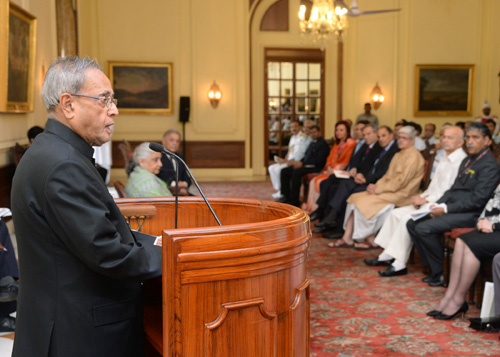
It gives me great pleasure to be here today to confer the Second Tagore Award for Cultural Harmony for the year, 2013, to Maestro Zubin Mehta. I congratulate the eminent Jury for their unanimous choice.
In felicitating Zubin Mehta with the Tagore Award, we are not only honouring a distinguished son of India, but we are recognizing his untiring efforts, over the decades, to convert music into an instrument of peace and harmony. He has made it his mission to bring hope and reason wherever there is conflict and discord. To audiences across the world, Zubin Mehta has brought a message of optimism - and conviction about the shared destiny of humankind. His name is synonymous with amity and faith. He is a legend in the world of music and an emissary of goodwill between nations. It is only appropriate that this award, instituted to promote the values of universal brotherhood, should be conferred upon him.
As the then Chairman of the National Implementation Committee for commemoration of 150th Birth Anniversary of Rabindranath Tagore, I recall that this award was instituted to celebrate the vision of Tagore for a more globalised and connected world. Rabindranath Tagore was an internationalist far ahead of his times. A versatile genius, he was a beacon of the cultural renaissance of India in the 19th and early 20th century. His writings on state and society, science and civilization, his musings as a philosopher, his works as a composer and his creations as an artist reflected his abiding love for pluralism and his deep devotion to the cause of humanity.
The lifetime of Rabindranath Tagore was witness to cultural, economic, political, and social differences that seemed to threaten the very fabric of our society. Through his progressive writings, Rabindranath endeavoured to bring down the walls of prejudice and remind people of the essential oneness of mankind.
Rabindranath Tagore also unequivocally endorsed art and music as harbinger of peace and harmony, which would create an environment for the harmonious coexistence of communities and nations. The Visva-Bharati University established by him is, even today, a focal point for international students wanting to experience the cultural and aesthetic values of India and the world.
Ladies and Gentlemen,
Rabindranath Tagore’s deep spiritual insight into music seemed to effortlessly unite the strains of the western and Indian schools and weave their diverse threads together in his unique compositions. Rabindranath Tagore was moved by the Bhatayali songs, the songs of the boatmen, the Baul compositions, the kirtans and the folk tunes. His music perfectly merged the melodies with the poetry that he composed into his famous Rabindra Sangeet. It is due to his exceptional work that he is revered as the first and greatest composer of modern India.
Rabindranath Tagore had prophetically stated that he hoped that even if he, himself, were to be forgotten, his music would live on. Today, a hundred and fifty years later, he is still an icon. Just as his writings are acclaimed by critics and connoisseurs of Bengali literature, his Rabindra Sangeet has been embraced by generations in the sub-continent and studied across the world.
Indeed, Rabindranath Tagore had a deep understanding of the musical traditions of the world. In a conversation with Albert Einstein, he had said, "I am deeply moved by western music – I feel that it is great, that it is vast in its structure and grand in its composition. Our own music touches me more deeply by its fundamental lyrical appeal. European music is epic in character; it has a broad background and is Gothic in its structure.”
Ladies and Gentlemen,
Zubin Mehta’s music, too, has the power to transcend boundaries. He has already marked 50 years of his celebrated and successful musical collaboration with the Vienna, Berlin and Israel Philharmonic Orchestras – and earned for himself a unique position in the musical narrative of the world.
It is a matter of pride for India that even though he is considered to be a citizen of the world, he has retained his Indian citizenship and, as he traverses the five continents and enthralls with his performances, he is India’s cultural ambassador. As he reaches out, through his music, to inspire states and their people with his message of tolerance and peace, we pay tribute to him for his unfailing efforts to foster unity and understanding among the communities of the world.
His spirit and dedication is an affirmation of Rabindranath Tagore’s vision of "that heaven of freedom” where the world is not divided "by narrow domestic walls”.
I congratulate Maestro Zubin Mehta once again and wish him a long life of good health and many more years of brilliant music.
Thank you.
Jai Hind.
